Water Issues in Iowa: Why Do Improvement Efforts Stagnate?
posted
by Guest Blogger on Wednesday, November 8, 2023
Guest blog by Jacquline Comito, Conservation Learning Group
The Conservation Learning Group (CLG) team continually relies on a diverse approach to better understanding the ways in which water quality matters to different Iowans, and uses the data it gathers as guidance for its outreach and education efforts. Beyond surveys and interviews, the CLG team regularly gathers fresh information and data through direct actions and engagement with stakeholders throughout Iowa. Placing an emphasis on newer voices and newer ideas has helped the team to develop innovative initiatives and drivers toward improving water quality for future generations.
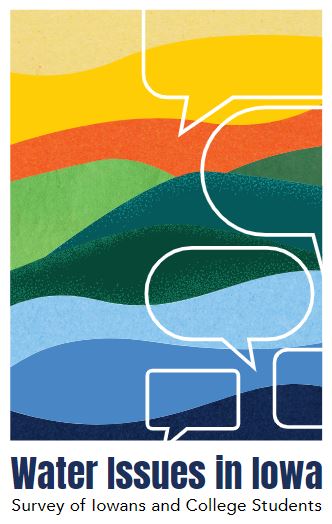 To complete the Water Issues in Iowa report, a broad spectrum of Iowans—college students, farmers, nonfarmers, rural and urban residents—participated in opportunistic surveys, interviews, and a series of listening sessions in 2022-23 to share their perspectives about water quality in the state. The goal was to take a snapshot of current attitudes and compare them to those from similar studies 10 and 15 years ago.
To complete the Water Issues in Iowa report, a broad spectrum of Iowans—college students, farmers, nonfarmers, rural and urban residents—participated in opportunistic surveys, interviews, and a series of listening sessions in 2022-23 to share their perspectives about water quality in the state. The goal was to take a snapshot of current attitudes and compare them to those from similar studies 10 and 15 years ago.
Water Issues in Iowa Survey
The last decade has seen significant increases in:
- Media coverage of water issues.
- Outreach and education on water quality.
- Funding to encourage reduced agricultural nutrient loads.
Key Findings
- All age and social groups are only slightly more aware of water quality issues and causes than in previous surveys.
- Awareness of the problem has not released an outpouring of action—there is little progress in improving water quality in the state.
How's the Water?
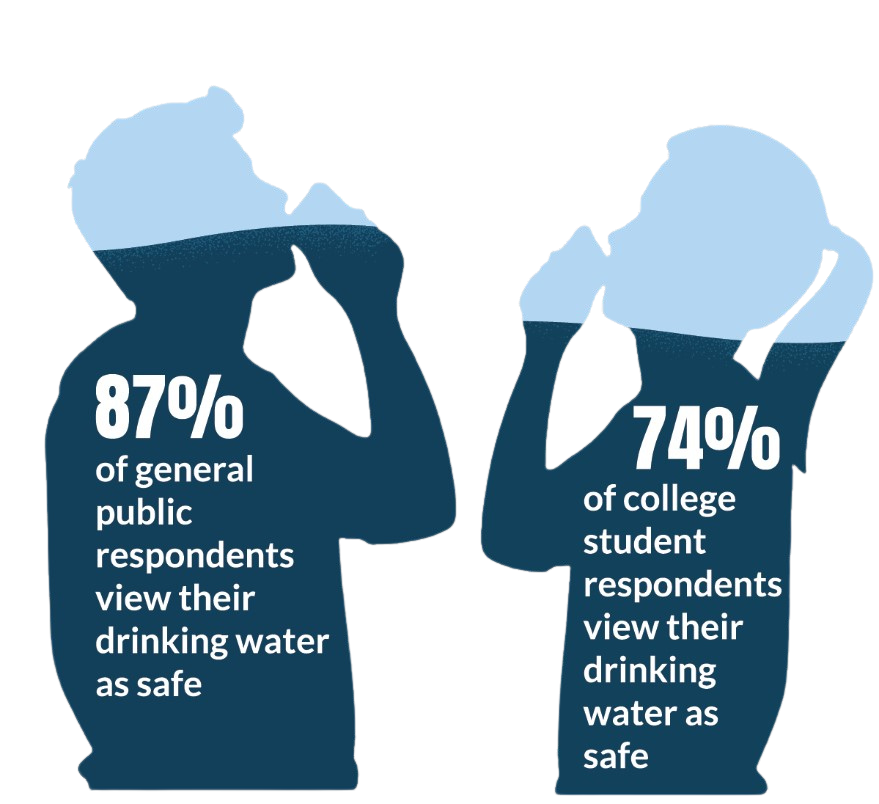 Drinking Water: Nearly half of general public respondents rely on wells for their drinking water. The Iowa Rural Drinking Water Survey (Lade, Comito, Benning, Kaiser, and Kling, 2022) found that private well water users generally believe their wells are safe, but <10% test their wells yearly.
Drinking Water: Nearly half of general public respondents rely on wells for their drinking water. The Iowa Rural Drinking Water Survey (Lade, Comito, Benning, Kaiser, and Kling, 2022) found that private well water users generally believe their wells are safe, but <10% test their wells yearly.
Groundwater: Confidence in groundwater quality varies, depending on whether respondents are engaged in farming or not. Both general public and students who farm have more confidence in groundwater today than a decade ago. Those who aren’t engaged in farming have less confidence in groundwater than they did a decade ago.
Surface Water: Nearly three-quarters of all respondents view surface water quality as fair or poor.
Student Responses: Hot, Cold, Just Right
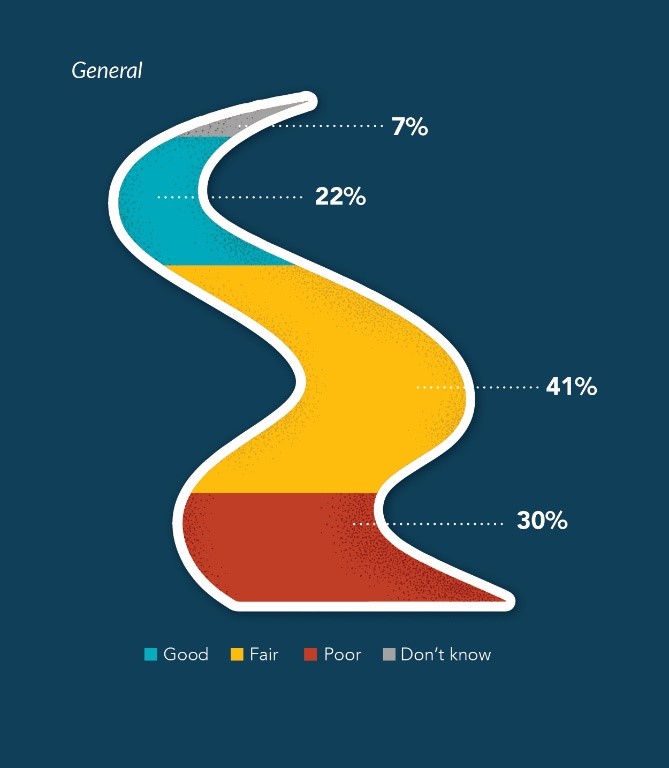 College students at Iowa’s three regent universities— Iowa State University, University of Northern Iowa, and University of Iowa—fall into a Goldilocks pattern in their perceptions of both drinking water safety and surface water quality. Each university’s location within its watershed, and the proximity of a river to campus, seems to affect student views of water quality. ISU is near its watershed headwaters, but the river is almost invisible to students day to day. UI is at the bottom of its watershed, but nobody can miss the Iowa River as it bisects campus. UNI is in the middle of the watershed and has a river a couple of miles away.
College students at Iowa’s three regent universities— Iowa State University, University of Northern Iowa, and University of Iowa—fall into a Goldilocks pattern in their perceptions of both drinking water safety and surface water quality. Each university’s location within its watershed, and the proximity of a river to campus, seems to affect student views of water quality. ISU is near its watershed headwaters, but the river is almost invisible to students day to day. UI is at the bottom of its watershed, but nobody can miss the Iowa River as it bisects campus. UNI is in the middle of the watershed and has a river a couple of miles away.
The closer to the river and the further downstream the campus, the more bearish students are about both drinking water and surface water quality.
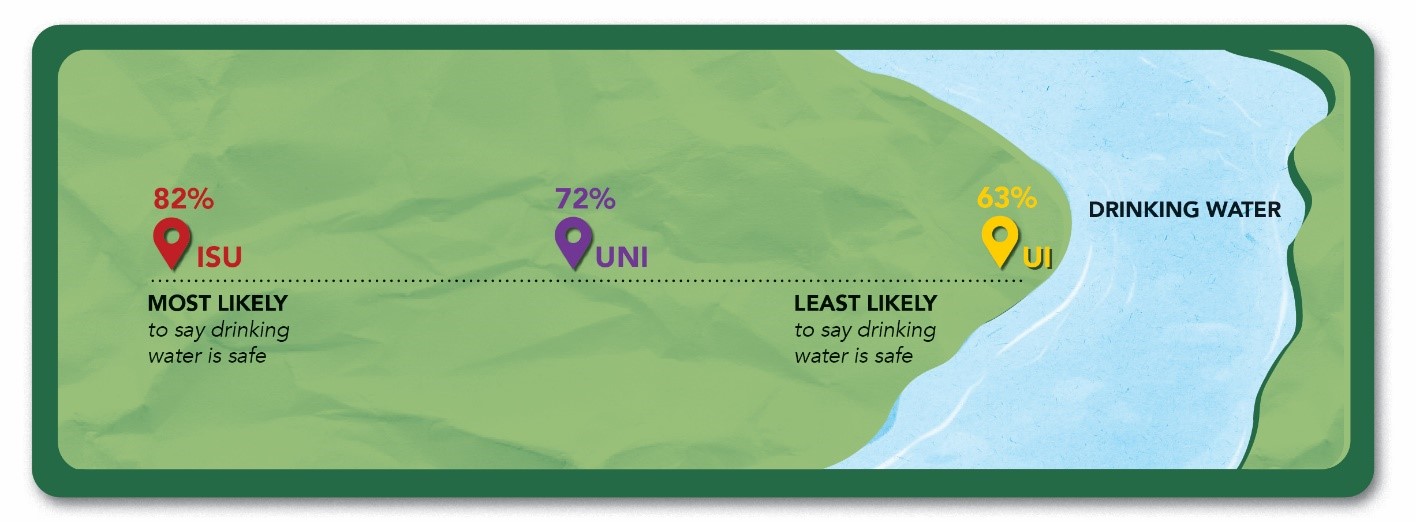
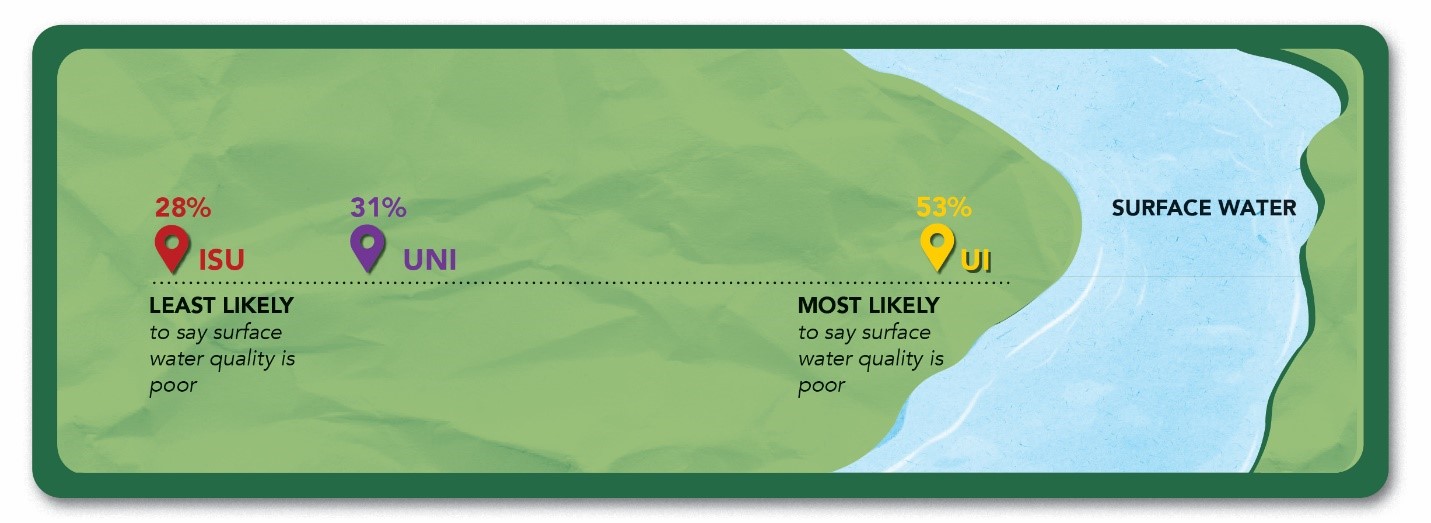
Students showed a slight increase in awareness but little confidence in their knowledge of water quality issues in Iowa and the Midwest. However, they had more urgent attitudes about one issue that during the last decade has inundated their classrooms and media, and affected their own lives—climate change.
What Causes Water Quality Problems and Who Should Fix It?
Survey respondents identified the conditions impacting water quality as:
- Hardness
- Fertilizer/nitrate
- Livestock waste
- Pesticides
- High bacteria counts
Most Iowans agree that agriculture is the primary cause of degraded water quality, with all but hardness closely linked to agriculture.
Who is responsible for restoring and protecting water quality in the state—and how do we achieve that? It depends on who you ask.
- General public respondents who farm tend to lean on individuals to protect water quality.
- Those who aren’t engaged in farming—as well as students who are—put higher responsibility on government.
Are We Paddling Upstream?
The snapshot shows more constancy than change. Analyzing these responses beside the findings of previous studies strongly indicates that all age and social groups are more aware of water quality issues and the factors most often contributing to those issues. While most of the respondents list agriculture as the primary cause of Iowa’s water quality challenges, there is less agreement on who should be responsible for fixing the problem or even how to fix the problem. It is this ambiguity that prevents the heightened awareness from translating into a significant change in perception or any sense of urgency about addressing the issues.
The water “temperature” is neither hot nor cold—though it can get a bit heated at times when farmers express frustration with being blamed or when urban residents discuss how they are being misled by what is happening.
Influencing people to change their minds and behavior around environmental issues such as clean water is one of the most difficult challenges facing our state. Perception gaps, differing priorities, and well-ingrained beliefs, as well as a continuing urban vs. rural divide, prevent any heightened awareness from translating into a sense of urgency about the state of water in Iowa.
Water Quality "Should" Matter to Us All
Iowans are well-known for coming together to help when tragedy strikes. The time is now for all Iowans to make clean water a priority:
- Invite a diversity of voices to the conversation and listen to them, particularly young people and women.
- Flood classrooms and media with persistent and honest clean water education and messaging.
- Pay attention to those messages—learn more about what affects water quality.
- Get to know the watershed you live in and efforts to support the health of local water bodies.
- Adopt practices—especially in production agriculture—that support clean and healthier water bodies.
Read the full report here, and get more information by watching or listening to interviews by Dr. Comito on Talk of Iowa (IPR) and Iowa Learning Farms.
About the Author
 Dr. Jacqueline Comito is actively involved in research, extension, and outreach activities in water, watershed-based community activities and environmental attitudes. Comito, an anthropologist, is the leader of two highly successful outreach and education programs at Iowa State University: Water Rocks! and Iowa Learning Farms. Her creativity and vision have propelled these programs to become highly successful and often requested across Iowa and the Midwest. Dr. Comito interacts with a variety of stakeholders including farmers, interested citizens, teachers, youth, environmental groups, and agency personnel.
Dr. Jacqueline Comito is actively involved in research, extension, and outreach activities in water, watershed-based community activities and environmental attitudes. Comito, an anthropologist, is the leader of two highly successful outreach and education programs at Iowa State University: Water Rocks! and Iowa Learning Farms. Her creativity and vision have propelled these programs to become highly successful and often requested across Iowa and the Midwest. Dr. Comito interacts with a variety of stakeholders including farmers, interested citizens, teachers, youth, environmental groups, and agency personnel.
- clean water
- drinking water
- public health
- water quality